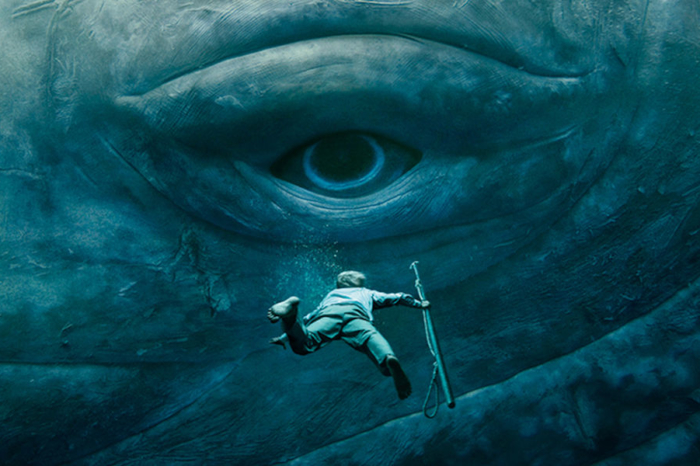Melville readies students for rough seas ahead
Read this op-ed in The Berkshire Eagle, The Salem News, and The Gloucester Daily Times.
BOSTON — “For all his tattooings he was on the whole a clean, comely looking cannibal,” is how Herman Melville describes the heroic Polynesian harpooner Queequeg in his 1851 classic, “Moby-Dick.” “[T]he man’s a human being just as I am: he has just as much reason to fear me, as I have to be afraid of him.”
Today (August 1) marks the bicentennial of Melville’s birthday. He was a self-educated, unorthodox literary genius, whose many family tragedies and disappointments kept him largely unnoticed during his lifetime.
Melville’s key works include the short story, “Bartleby, the Scrivener” (1853); a novel, “The Confidence-Man” (1857); a book of Civil War poetry, “Battle-Pieces” (1866); and a 500-page poem about a Holy Land pilgrimage, “Clarel” (1876). His incomplete, posthumously published novella, “Billy Budd (1924),” propelled the early-20th-century “Melville Revival.”
“Call me Ishmael,” the opening of “Moby-Dick,” is the most famous line in American literature. There are many versions of the novel adapted for all age groups, but schools, teachers, and students remain intimidated by this monumental, timeless, and strange book.
In 1997, John Silber, the brilliant, irascible president of Boston University and chairman of the Massachusetts Board of Education, made content-phobic pedagogues spouting mad when he declared that high schoolers should read “Moby-Dick” to graduate. Despite the educratic mutinies, the Bay State later charted a course towards the nation’s best K-12 English standards and highest reading scores.
Massachusetts, after all, contributed significantly to the creation of “Moby-Dick.” New Bedford’s whaling industry was an inspiration for the subject, while Melville’s Pittsfield farmhouse “Arrowhead” was where this exceptional 32-year-old wrote arguably the greatest American novel.
Amazingly, “Moby-Dick” only sold 3,215 copies in Melville’s time, earning him a meager $1,260. His best-selling book was “Typee” (1846), a semi-autobiographical South Pacific adventure story set on the cannibal-infested island, Nuku Hiva.
As many know, “Moby-Dick” is a tumultuous sea disaster tale aboard the whaling ship Pequod. The peg-legged, megalomaniacal Captain Ahab seeks tragic vengeance against a ferocious white sperm whale — variously a symbol of divinity or nature’s unconquerable power — that bit off his leg and scarred his soul.
At minimum, students should read Nantucket historian Nathaniel Philbrick’s short book, “Why Read ‘Moby-Dick’?” (2011). He makes clear that Melville’s whale tale encompasses eternal wisdom from the Bible, ancient epics, and Shakespeare, while teaching readers fundamental lessons about friendship, demagogic tyrants, and America’s democratic character.
“Queequeg was George Washington cannibalistically developed,” Melville wrote metaphorically.
In between the chapters on chowder, whale anatomy, and the Pequod’s diverse crew, the narrative feasts on peoples’ sensibilities by quietly portraying the stoic, virtuous cannibal Queequeg as a humane-hearted hero.
“Moby-Dick” is dedicated to Melville’s friend and fellow novelist Nathaniel Hawthorne. Along with reading about Huck and Jim in Mark Twain’s “Huckleberry Finn,” social-media-consumed U.S. students should take a deep dive into Queequeg’s self-sacrificing friendship with “Moby-Dick’s” school-teaching narrator, Ishmael.
A Kokovoko island prince, Queequeg is covered with hieroglyphic-style tattoos that contain “a complete theory of the heavens and the earth, and a mystical treatise on the art of attaining truth.” No pasteboard multicultural figure, Queequeg is widely acknowledged by scholars to embody all humanity and its highest ideals.
TRUTH TELLER TO A FAULT
Queequeg is the best harpooner and demonstrates courage when rescuing Native American crewmate Tashtego from drowning in a whale carcass. By contrast, first-mate Starbuck’s quaint pieties fail to arrest Ahab’s fanatical crusade against the White Whale. Importantly, Queequeg’s premonition of doom compelled him to commission the floating coffin that eventually ensures Ishmael survives to tell us the story.
American students should appreciate Melville’s magnificence. A full decade before the Civil War’s carnage, only a highly unconventional writer of profound depth could craft a poetic novel using an enlightened cannibal to devour America’s racial, nativist, and religious stereotypes. Truth-telling and genre-shattering to a fault, Melville never really earned a living as an author and died a forgotten customs house clerk in New York City.
“Who would have looked for philosophy in whales, or for poetry in blubber?” remarked an 1851 London book review of “Moby-Dick.”
As America’s cultural ship of state seems awash in crazy sea captains, ignoble savagery, and uncivilized oddities who offer more whale lard than illumination, maybe Herman Melville and his friendly cannibal Queequeg can help keep students intellectually buoyant in the rough seas ahead.
Jamie Gass is director of the Center for School Reform at Pioneer Institute, a Boston-based think tank.
Get Updates on Our Education Research
Related Posts




